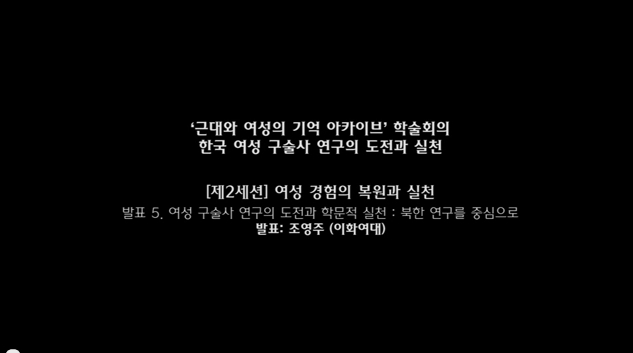This paper is a study on the third and fifth volumes of Jinbeolhwigo-sokpyeon, a recently discovered book on records of pre-modern Korean characters. This section contains considerable records of Taoists and various diviners. The purpose of the study ...
http://chineseinput.net/에서 pinyin(병음)방식으로 중국어를 변환할 수 있습니다.
변환된 중국어를 복사하여 사용하시면 됩니다.
- 中文 을 입력하시려면 zhongwen을 입력하시고 space를누르시면됩니다.
- 北京 을 입력하시려면 beijing을 입력하시고 space를 누르시면 됩니다.

도류 취편의 전통과 술가의 분리 : 『진벌휘고속편』의 도류 · 술사 편제방식과 의미 = Traditon of Compilation of Taoist Figures and Separated Perception of Oculator
한글로보기https://www.riss.kr/link?id=A107984848
- 저자
- 발행기관
- 학술지명
- 권호사항
-
발행연도
2021
-
작성언어
-
-
주제어
진벌휘고속편 ; 진휘속고 ; 해동이적 ; 인물지 ; 도사 ; 술사 ; Jinbeolhwigosokpyeon ; 『震閥彙攷續編』 ; Jinhwisokgo ; 『震彙續攷』 ; Haedong-ijeok ; 『海東異蹟』 ; A book that collects articles about people ; Taoist ; Diviner
-
KDC
800
-
등재정보
KCI등재
-
자료형태
학술저널
- 발행기관 URL
-
수록면
105-138(34쪽)
- 제공처
- 소장기관
-
0
상세조회 -
0
다운로드
부가정보
다국어 초록 (Multilingual Abstract)
This book is a compilation of articles on characters from various previous literatures. Existing studies have focused on revealing literature data related to this book, and there have been quite good results. However, it was a problem that even documents that were not direct were indiscriminately listed. Therefore, through this study, a total inspection was conducted and additional investigations were also conducted. As a result, only the literature that the author of this book would have directly referenced was selected and organized. As a result, it was found that this book was created as a digest version while expanding the subject based on the previously published Haedong-ijeok.
On the other hand, this book is a compilation of the characters by classification. This is unprecedented among books that collect articles about peoples. In this type of book, what kind of people are chosen and how people are classified shows the way the author perceives the world. Paying attention to this point, I identified the meaning of taoists and several diviners in independent categories. Taoists and several diviners were alienated from the traditional Confucian society, but the author of Jinbeolhwigosokpyeon treated them the same without discrimination from other characters. This is what the author of this book thinks these people are important beings in the world, acknowledging that they were forming an independent genealogy. It is also noteworthy that diviners, which have not been distinguished from taoists, were viewed as individual beings and their identity was recognized. This has academic significance in that it is one of the aspects that expands the perception of humans and the world in the cultural history of Korea in the 18th and 19th centuries.
This paper is a study on the third and fifth volumes of Jinbeolhwigo-sokpyeon, a recently discovered book on records of pre-modern Korean characters. This section contains considerable records of Taoists and various diviners. The purpose of the study is to clarify the uniqueness of the compilation system and derive academic significance from it.
This book is a compilation of articles on characters from various previous literatures. Existing studies have focused on revealing literature data related to this book, and there have been quite good results. However, it was a problem that even documents that were not direct were indiscriminately listed. Therefore, through this study, a total inspection was conducted and additional investigations were also conducted. As a result, only the literature that the author of this book would have directly referenced was selected and organized. As a result, it was found that this book was created as a digest version while expanding the subject based on the previously published Haedong-ijeok.
On the other hand, this book is a compilation of the characters by classification. This is unprecedented among books that collect articles about peoples. In this type of book, what kind of people are chosen and how people are classified shows the way the author perceives the world. Paying attention to this point, I identified the meaning of taoists and several diviners in independent categories. Taoists and several diviners were alienated from the traditional Confucian society, but the author of Jinbeolhwigosokpyeon treated them the same without discrimination from other characters. This is what the author of this book thinks these people are important beings in the world, acknowledging that they were forming an independent genealogy. It is also noteworthy that diviners, which have not been distinguished from taoists, were viewed as individual beings and their identity was recognized. This has academic significance in that it is one of the aspects that expands the perception of humans and the world in the cultural history of Korea in the 18th and 19th centuries.
동일학술지(권/호) 다른 논문
-
표류하는 여성 괴물 2 : 『태원지』 속 여성 괴물의 형상과 의미
- 민족문학사학회·민족문학사연구소
- 김선현 ( Kim Seon-hyeon )
- 2021
- KCI등재
-
- 민족문학사학회·민족문학사연구소
- 서혜은 ( Seo Hye-eun )
- 2021
- KCI등재
-
조선후기 젠더의식의 복합성에 대하여 : 『삼의당고(三宜堂稿)』를 중심으로
- 민족문학사학회·민족문학사연구소
- 성민경 ( Sung Min-kyung )
- 2021
- KCI등재
-
조선본 『수계선생비점맹호연집(須溪先生批點孟浩然集)』의 17세기 일본 수용
- 민족문학사학회·민족문학사연구소
- 이유리 ( Lee Eury )
- 2021
- KCI등재




 KISS
KISS







